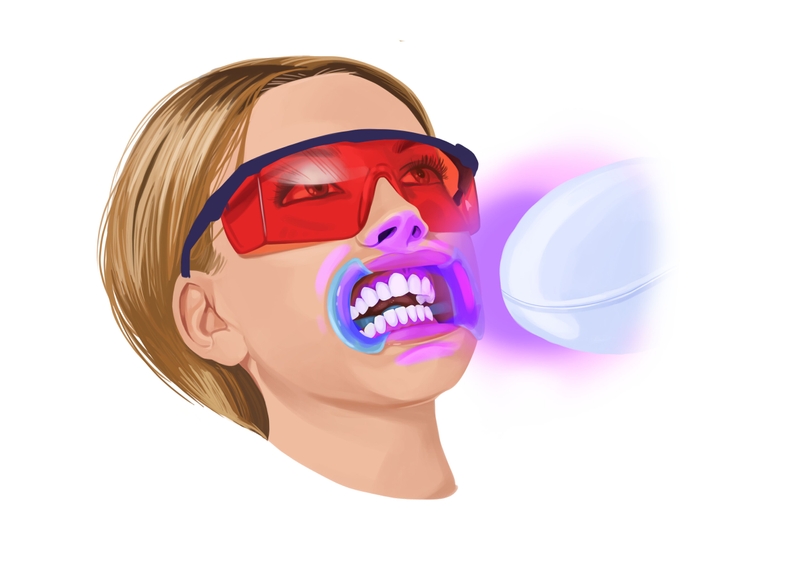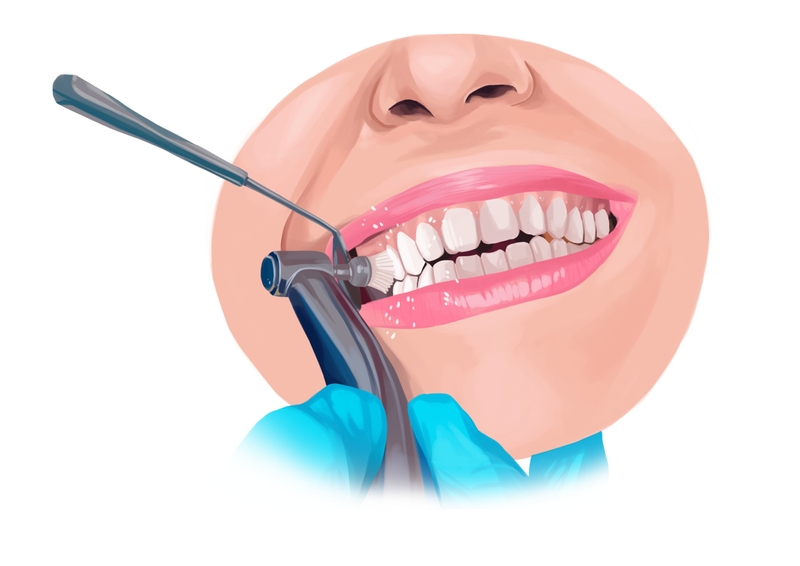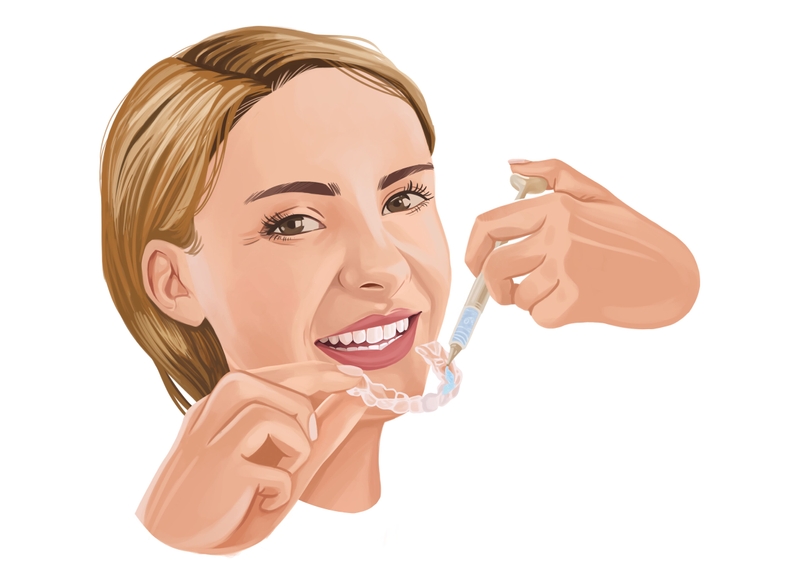- The cost of teeth whitening starts from $25 for over-the-counter products. Professional teeth whitening can cost up to $1,300 for both arches.
- The average cost of professional in-office teeth whitening is $300 per arch.
- The type of whitening procedure you need will depend on the severity of your discoloration. You may need additional procedures such as internal bleaching, veneers or crowns.
Use Authority Dental to book inexpensive local dentists, or sign up for a dental discount plan and save big on all dental procedures, including whitening.
Is teeth whitening an affordable procedure? Here's everything you need to know.
Average cost of teeth whitening

Picture by Authority Dental under CC 2.0 license
The cost of teeth whitening near you range from $25 (for OTC products) up to $1,300 (when having both arches done professionally).
| WHITENING TYPE | AVERAGE COST | COST RANGE |
|---|---|---|
| External in-office (per tooth) | $70 | $40-$275 |
| External in-office (per arch) | $300 | $125-$625 |
| External for home application (per arch) | $250 | $75-$500 |
| Internal (per tooth) | $300 | $75-$500 |
| External, OTC products | $150 | $25-$200 |
The whitening process to remove stains from teeth will temporarily brighten them and remove staining, no matter how stained teeth are. The external whitening method is used in simple cases. If your situation is more severe (dead tooth or RCT discoloring) you might need internal bleaching or even veneers or crowns performed by a dentist.
If your staining is caused by tetracycline or smoking you may have to drag out the procedure and be billed on a “pay-as-you-go” basis. This could be more expensive than traditional whitening, since it is harder to determine how many treatments will be needed.
Associated costs

Picture by Authority Dental under CC 2.0 license
There are some procedures associated with teeth whitening other than the treatment per se.
| PROCEDURE | AVERAGE COST | COST RANGE |
|---|---|---|
| Dental exam | $100 | $50-$250 |
| Periapical X-ray | $35 | $25-$50 |
| Teeth cleaning | $100 | $70-$250 |
| Enamel microabrasion | $100 | $50-$250 |
| Fluoride gel carrier | $150 | $30-$350 |
The dentist will be the one making the final decision as to what is needed.
Dental exam
Before the teeth can be whitened one has to make sure they are a good candidate. This means there cannot be significant decay, gum disease, infections, and tooth sensitivity. Those are additional costs you have to consider before whitening.
Other contraindications to whitening are pregnancy, sensitive teeth, cracks, or exposed dentin. If you are having your periodic exams every six months, you will know what is going on inside your mouth.
Also, if you have had work done on your front teeth it’s good to check that the materials used will change color as well. More often they will not, as shade-matching composites are a recent innovation.
Dental X-rays
Consider the costs of dental X-rays when whitening your teeth. They can show the tooth from the crown to the tip of the root (below the gums). Decay that isn’t visible to the human eye can also show up.
You can expect a bitewing and a periapical radiograph. You can learn more about dental X-rays and their types in our article.
Dental cleaning
Sometimes the dentist can bleach the teeth over existing plaque. More often than not, however, he or she will advise you to have a dental cleaning. This can remove mild stains and make whitening redundant.
You should include the cost of such a professional cleaning in your whitening budget. In more extreme cases you might even need to pay for scaling and root planing.
If you have your teeth cleaned every six months, as advised by the ADA, this extra step might not be necessary. More often than not, however, patients will skip this routine procedure, allowing plaque buildup.
Enamel microabrasion
This procedure is a mixture of chemical and mechanical treatment. A small amount of tooth enamel is removed to get rid of discoloration.
This only works on the surface. Microabrasion targets both extrinsic and intrinsic staining. The former includes dietary or lifestyle choices (tobacco, coffee) and the latter is most commonly caused by disease.
This treatment is common among those affected by fluorosis (high exposure to fluoride in the first eight years of one’s life). If your teeth aren’t fully erupted it will be difficult to place the rubber dam. Other than that there are no contraindications to this procedure.
Fluoride gel carrier
Fluoride can help prevent decay and strengthen the enamel, and that’s why it is included in our tap water. Sometimes the dentist might recommend using a fluoride gel carrier after whitening to remineralize the teeth. It works similarly to bleaching trays.
A custom tray that will fit your mouth perfectly will be made at the office. You will wear it with fluoride serum for about five minutes every day. It is important not to rinse your mouth or eat anything for thirty minutes after doing this.
Does insurance cover teeth whitening?

Picture by Authority Dental under CC 2.0 license
Unfortunately, it is unlikely that your insurance will cover the costs of teeth whitening. This procedure is deemed cosmetic, and providers are reluctant to cover anything that is not medically necessary.
If you do manage to convince your policy provider to cover some of the related costs, maybe a dental exam, or a prophy prior to bleaching, you will have to deal with a lot of paperwork.
Since getting your insurance provider to cover cosmetic treatments is tricky, you are probably looking for alternative ways to save. We recommend signing up for a dental discount plan. They offer reductions on all procedures, including cosmetics. They are particularly handy when it comes to whitening.
You won’t need to collect any paperwork or worry about yearly caps. What’s more, you can use your plan to save after the annual maximum on your insurance is reached. There is a regular fee you have to pay, like a membership, and the discounts are ready to be used the day you sign up.
Finally, if you want whiter teeth, but don’t have the money for pricey cosmetic dentists, try a teeth whitening kit. And if you have sensitive teeth, you'll want to use a whitening product that is made specifically for sensitive teeth.
FAQ
Is professional teeth whitening worth the price?
Going to a dentist rather than bleaching your teeth at home with OTC products comes with its benefits. Those usually include a lower risk of side effects and results that are visible right away.
Whitening from home usually takes a couple of weeks and no professional makes sure that you are a good candidate for his treatment. Sensitivity is one thing that is sure to happen, no matter whether you bleach your teeth yourself, or whether you get them professionally done.
What is the cheapest way to get your teeth whitened?
The cheapest way to whiten your teeth is using OTC products. You can find them online and in drugstores. You should be aware, though, that bleaching your teeth this way can take a few weeks or even months and requires you to repeat the treatment everyday.
External in-office bleaching can turn out to be more affordable than buying some high-end products. It all depends on whether you can find a good deal. Either way, consult with a dentist before starting treatment yourself.
Namrita Harchandani, DMD
Major cost factors are quality and safety of whitening products used and the expertise of the dental professional ensuring that best results are achieved while avoiding any side effects.